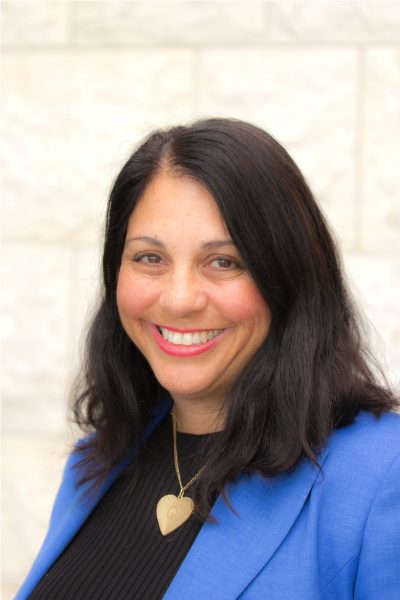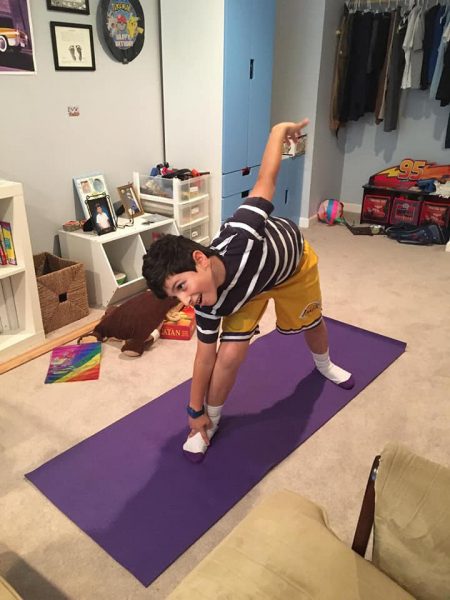
Chezki Mark, a third-grader at Irvine Hebrew Day School, found he had a lot of time on his hands at home since his school closed due to coronavirus precautions.
What to do?
No need to fret. Laguna Beach schools officially closed March 13. The following Monday, Keces and her teachers from IHDS delivered school kits to their kindergarten-through-sixth-graders with everything they’d need: Chromebooks, textbooks, workbooks, art and crafts supplies, math tools, a photo collage of classroom wall charts and, of course, a squeezy-brain stress ball, and their prayer books.
With online help from his art, language and Hebrew teachers, Chezki decided to use his daily “educational exploration time,” also known as playtime, writing a story for his three-year-old brother, first in English, then in Hebrew, and illustrating it with his own drawings.
“We build that in every day to their schedules,” said Tammy Keces, a Laguna Beach resident and founding principal of the school. “They get to do something they choose, write a story they love, play music, build something, create a game or even plan meals for their families.”
The process of switching to online learning, what she and her teachers coined “remote collaborative learning,” was seamless, Keces said, collaborative being the keyword.
Online schooling is an “imperfect” situation at best, said Alfie Kohn, author of several books on education, including “The Schools Our Children Deserve.”
“Online learning is a temporary necessity and can never take the place of inviting students to wrestle with ideas together,” Kohn said.
Keces, her staff of nine teachers and a rabbi at the Santa Ana-based school spent that first weekend detailing daily class schedules. They email the daily line-up to each of their students, outlining what they’re going to study and talk about. The teachers meet online with their students as a class and individually.
The best way teachers can help students now is to listen to them, Kohn said.
“Teachers can make the best of an imperfect arrangement by shaping the lessons around students’ questions, by focusing more on deep understanding than on memorizing facts or practicing skills and by doing whatever they can to foster interaction among the learners,” he said.
Keces instructed teachers to keep the daily schedule for online learning as close to the normal classroom schedule as possible. One teacher sent owl pellets home in her study packet so she and her students could dissect them together.
“My son’s in high school, he sees his teacher online maybe once during the day,” Keces said.
She added that her “office door” is always open to parents, special-needs students are being attended to, and the school psychologist is in.
“Teachers are giving the students suggestions and direction on how to accomplish this learning,” Keces said. “We’re not abandoning these families and their kids. The parents are not home-schooling their children. The kids are schooling themselves.”
Susan Berezovsky’s two boys, Jordan and Roni, are learning at home alongside her and her husband, who have to work from home now, too.
“We just have a big balancing act here,” she said. “We’re not as productive as we normally are at the office.”
It’s not ideal in terms of in-person class interaction, she agrees, but her sons are getting the hang of it. Fourth-grader Roni is becoming the class go-to tech guy. Jordan, a first-grader, started an after-school Zoom chat with his friends.

“Our students are excited to wake up every day and go to remote school because they still feel engaged and they’re learning,” Keces said. “I just had a lunch-bunch meeting with some students on Zoom. We ate lunch together. I led a Tuesday Smoozeday with the parents so they could talk to me.”
Rabbi Baruch Rock is providing Torah study and the school’s Hebrew teacher, Anat Vizanski Levi, is also giving yoga classes to the students and their parents.
IHDS students are taught skills to be independent so they’re now able to navigate this change at home, Keces said.
“Our model of real life skills is showing up when they’re needed most,” she said. “The kids don’t want to be left alone right now. They want something to do. They’re feeling successful with this transition.”




